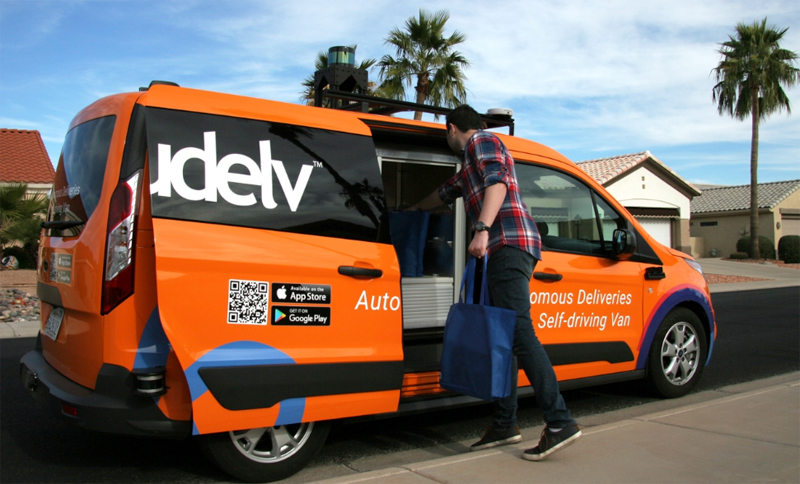Predicting that the delivery world will suffer mightily from a growing shortage of drivers, California-based Udelv is researching, building and hiring to help commercialize autonomous automobile deliveries with a particular focus on groceries, retail goods and, eventually, prepared meals.
We recently brought you the story of Udelv partnering with H-E-B, the largest grocer in Texas, which prompted a deeper dive with Adriel Lubarsky, Udelv’s director of business development, who previously ran a delivery company near North Carolina’s Research Triangle.
He said the company’s delivery clients have included Walmart, Napa and other big retailers that has underscored its belief that focusing on delivery-specific autonomy——suburban environments and shopping center parking lots instead of freeways—has been a wise play on its quest to make money with driverless deliveries.
There are only six Udelv vehicles on U.S. roads at present, and they all still have a human driver serving more as a silent observer, including studying the handoff between customers and the van itself. Lubarsky said part of his job at Udelv involves working with other mega-companies and prodding them to launch much larger driverless projects, hopefully closer to 50 or 100 vehicles at a time. It expects to be in the “high dozens” by sometime in 2020 due to contracts that the company claimed have already been signed.
“What we have today is epic,” Lubarsky said of its test vehicles that are based on workaday Ford Transit Connect cargo vans. “It’s our second-generation vehicle built on the experience of thousands of deliveries.”
While Lubarsky doesn’t see capacious delivery vans ever hitting profits delivering a single burrito at a time, for example, he said he sees huge potential for group orders going to a single destination, like feeding a large-scale office building with hundreds of employees. That concept is similar to catering provider Foodsby’s model, which he was unfamiliar with.
“Those drivers take up an enormous amount of everything at a company like Postmates, and if we can allow them to focus on the customers and the restaurants and build a better platform for them, we say, ‘hey all you have to do is send us orders and our cars take care of it’—I think that would have a lot of value,” he added.
Contrary to the common narrative that government regulations are a massive speed bump preventing more widespread adoption of driverless delivery systems, Lubarsky said the Trump administration and, in specific, Secretary of Transportation Elaine Chao are both sweet on the nascent industry and helping smooth out the road ahead.


